Museum am Strom
The Museum am Strom, located directly at the entrance to one of Germany's UNESCO World Heritage sites, the Upper Middle Rhine Valley, enjoys a magnificent view of the Binger Loch from it's doorstep
H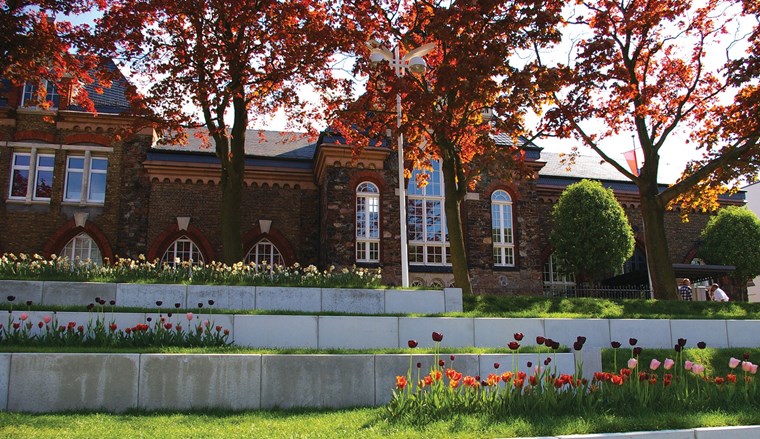 ere, from these idyllic surroundings, the Museum am Strom invites you to discover and explore 2000 years of fascinating culture and history on the Rhine.
ere, from these idyllic surroundings, the Museum am Strom invites you to discover and explore 2000 years of fascinating culture and history on the Rhine.
Permanent and special exhibitions on Hildegard von Bingen, Rhine Romanticism and the history of the town are all presented here in this historical power station dating from 1898.
Museum am Strom flyer (PDF document)
Virtual panorama tour
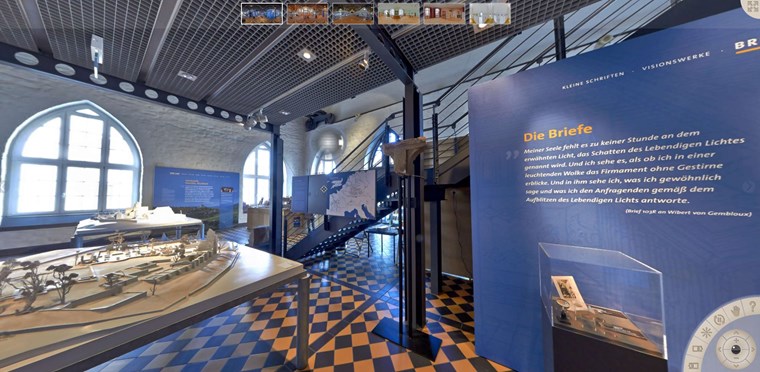
Here you get to the virtual panorama tour through the Museum am Strom
The Bingen Doctor’s Cutlery
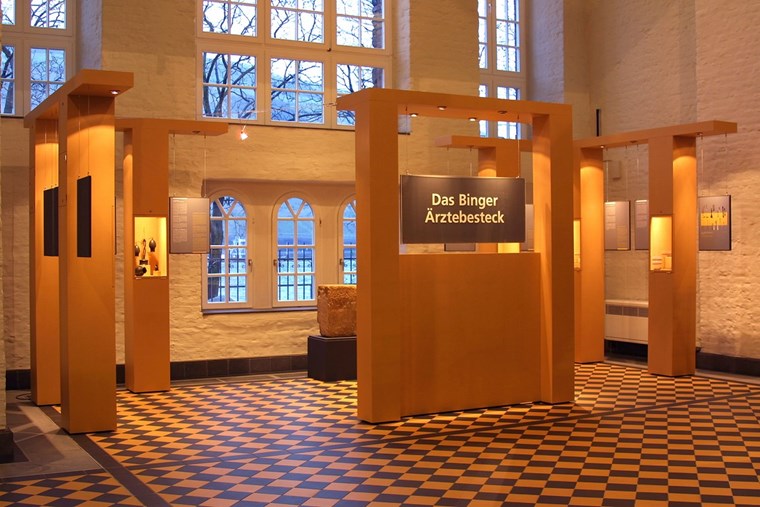 In 1925, a 2nd Century Roman burial site was discovered during construction work in the center of Bingen. Archaeologists unearthed a Doctor’s Grave, consisting of an urn and large bronze bowl containing 66 pieces of a Roman surgeon’s tools. The find was an archaeological sensation.
In 1925, a 2nd Century Roman burial site was discovered during construction work in the center of Bingen. Archaeologists unearthed a Doctor’s Grave, consisting of an urn and large bronze bowl containing 66 pieces of a Roman surgeon’s tools. The find was an archaeological sensation.
The ‘Bingen Doctor’s Set’ is the largest collection of ancient medicinal instruments in the world. The instruments demonstrate that the Roman’s surgical technique was advanced, rivalling modern medicine in several areas including, for example, cranial injuries.
The exhibition, which shows the entire tomb inventory, offers a comprehensive introduction to Roman Medicine, outlining in detail the various practices used.
Hildegard von Bingen Life and Work
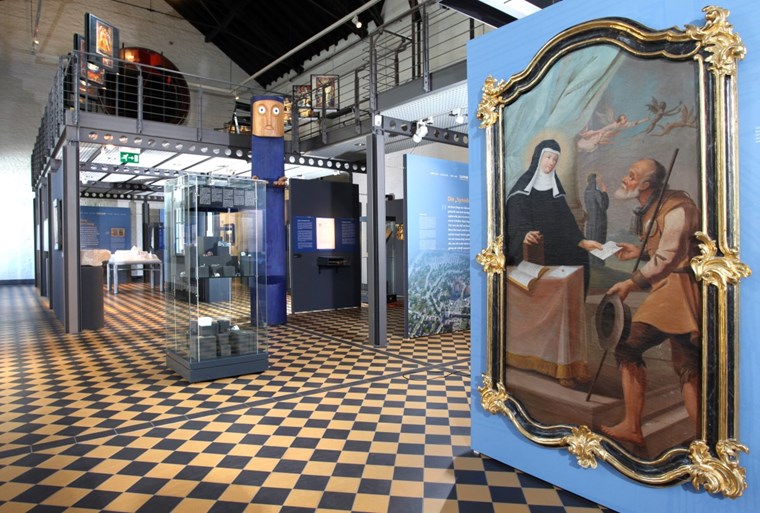 A highlight of the Museum am Strom is the permanent exhibition of the 12th Century German mystic, Hildegard von Bingen. Hildegard was an abbess, counsellor and admonisher, visionary, theologian, composer and healer, and in 2012 she was the first woman in Central Europe to be elevated to the rank of Doctor of the Church by Pope Benedict XVI. This exhibition also focuses on Hildegard as a person. In an exciting presentation, visitors can expect a variety of encounters with one of the most important female figures in world and church history. Here for the first time, the life of the prophetess, politician and naturalist is told consistently on the basis of historical research. Valuable objects, first prints and models convey an authentic picture of the abbess of the Rupertsberg Monastery in Bingen. Multimedia installations, an elaborate graphic design and several hands-on objects for young and old ensure that the educational journey back in time is a memorable one. Nowhere else is the life and work of the saint documented more comprehensively than here, at her historical place of work in Bingen.
A highlight of the Museum am Strom is the permanent exhibition of the 12th Century German mystic, Hildegard von Bingen. Hildegard was an abbess, counsellor and admonisher, visionary, theologian, composer and healer, and in 2012 she was the first woman in Central Europe to be elevated to the rank of Doctor of the Church by Pope Benedict XVI. This exhibition also focuses on Hildegard as a person. In an exciting presentation, visitors can expect a variety of encounters with one of the most important female figures in world and church history. Here for the first time, the life of the prophetess, politician and naturalist is told consistently on the basis of historical research. Valuable objects, first prints and models convey an authentic picture of the abbess of the Rupertsberg Monastery in Bingen. Multimedia installations, an elaborate graphic design and several hands-on objects for young and old ensure that the educational journey back in time is a memorable one. Nowhere else is the life and work of the saint documented more comprehensively than here, at her historical place of work in Bingen.
Hildegard Garden
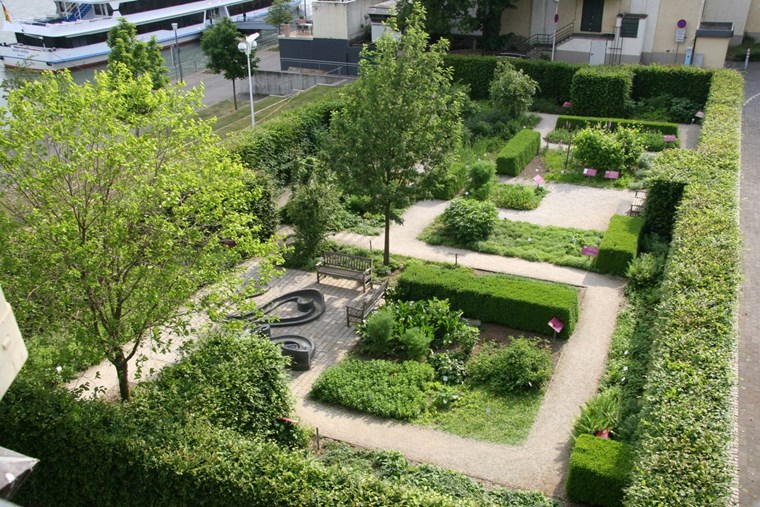 As a permanent addition to the Hildegard exhibition, the garden displays numerous plants mentioned in Hildegard's natural history writings. The learned Benedictine described almost 300 herbs, shrubs and trees and their (healing) effects on humans. Visitors can stroll through the uniquely designed Hildegard Garden and take time to explore the themed gardens inspired by her Physia book. These include a total of 15 thematic beds and eight individual beds based on the „book of plants“ and „book of trees“ presented here with descriptions of the various healing applications applying to each plant or tree. Unfortunately, the work has only survived in copies from the late Middle Ages, so that no one today knows the "original text". But unlike many of popular writings on so-called "Hildegard medicine", which simply ignore this fact, this problem is vividly addressed in the Hildegarten. The Hildegarten invites you to stroll and linger, revealing many a surprise for those concerned with the healing power of plants.
As a permanent addition to the Hildegard exhibition, the garden displays numerous plants mentioned in Hildegard's natural history writings. The learned Benedictine described almost 300 herbs, shrubs and trees and their (healing) effects on humans. Visitors can stroll through the uniquely designed Hildegard Garden and take time to explore the themed gardens inspired by her Physia book. These include a total of 15 thematic beds and eight individual beds based on the „book of plants“ and „book of trees“ presented here with descriptions of the various healing applications applying to each plant or tree. Unfortunately, the work has only survived in copies from the late Middle Ages, so that no one today knows the "original text". But unlike many of popular writings on so-called "Hildegard medicine", which simply ignore this fact, this problem is vividly addressed in the Hildegarten. The Hildegarten invites you to stroll and linger, revealing many a surprise for those concerned with the healing power of plants.
Town history
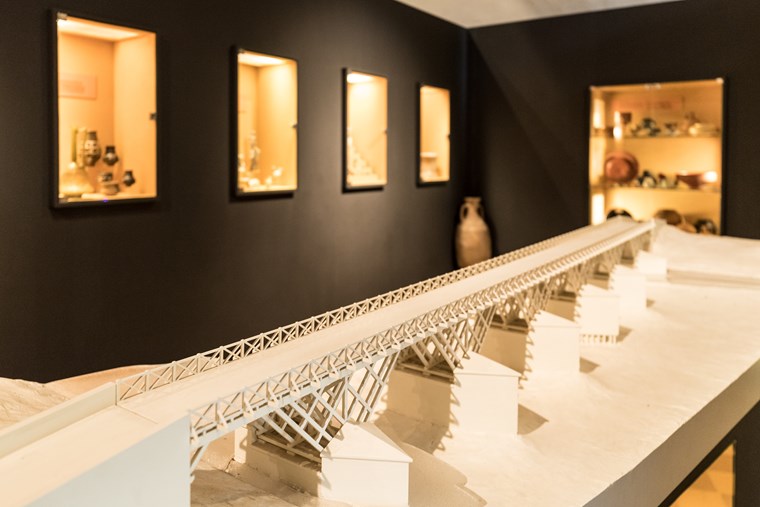 The motto of the town history exhibition is "Bingen - building bridges through two millennia". Four bridges at four different locations on the Rhine and Nahe rivers document Bingen's special position in terms of transport history, which has determined the towns development down through the ages.
The motto of the town history exhibition is "Bingen - building bridges through two millennia". Four bridges at four different locations on the Rhine and Nahe rivers document Bingen's special position in terms of transport history, which has determined the towns development down through the ages.
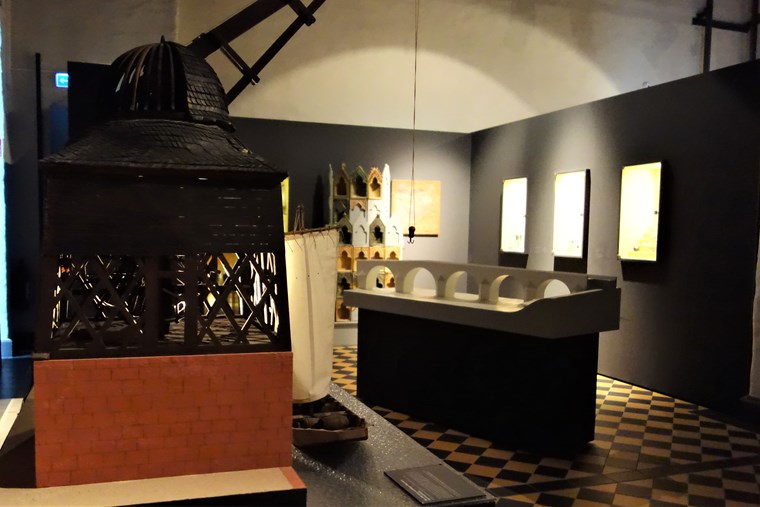 The bridges , which serve as a visual leitmotif throughout the exhibition, guide the visitor through two millennia of the town's history, beginning with the Romans, through to the Middle Ages, and ending with the 19th Century. The Roman section presents the most important items from the nationally significant archaeological collection and describes life in Roman BINGIVM. The section on the Middle Ages shows trade and change in the flourishing port town on the Rhine. A reconstructed tiled stove from 1400 and a model of the old crane are among the chief objects in the exhibition. Modern Bingen is presented not only with numerous paintings and documents, but also with the technical achievements of the 19th century, from the penny-farthing bicycle to the fire engine of 1850.
The bridges , which serve as a visual leitmotif throughout the exhibition, guide the visitor through two millennia of the town's history, beginning with the Romans, through to the Middle Ages, and ending with the 19th Century. The Roman section presents the most important items from the nationally significant archaeological collection and describes life in Roman BINGIVM. The section on the Middle Ages shows trade and change in the flourishing port town on the Rhine. A reconstructed tiled stove from 1400 and a model of the old crane are among the chief objects in the exhibition. Modern Bingen is presented not only with numerous paintings and documents, but also with the technical achievements of the 19th century, from the penny-farthing bicycle to the fire engine of 1850.
Rhine Romanticism
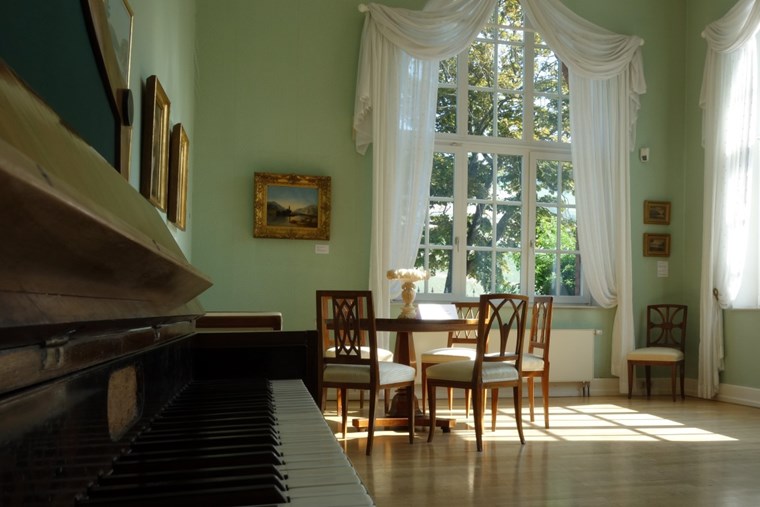
Museum education and experience workshop
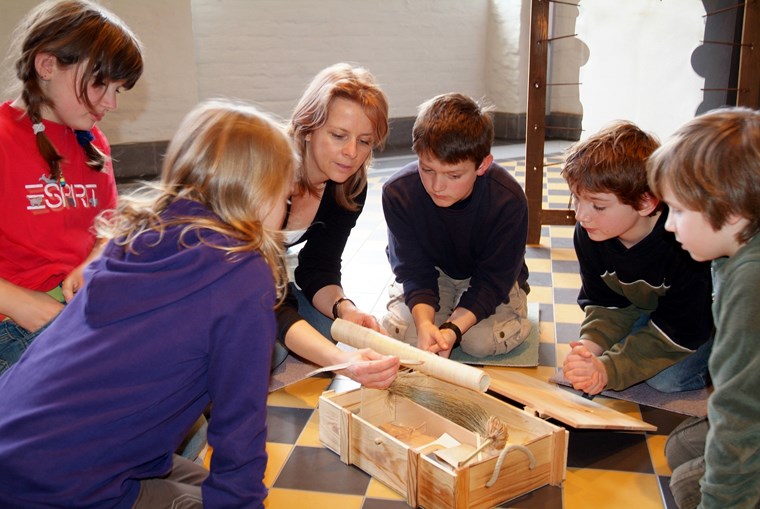
The adventure workshop on the first floor of the museum presents itself as a medieval writing room, where young visitors can learn all about the strenuous work that went on in a monastery from Conrad, the museum expert.
For school classes, children's birthday parties and children's groups, the museum offers different programmes on individual focal points: from the Romans to the Middle Ages with Hildegard von Bingen to travelling along the Rhine. The varied programme ranges from guided tours to workshops in the adventure workshop and is tailored to different age groups.
Information and advice: museumspaedagogik@bingen.de.
Service:
Opening hours:
Tuesday - Sunday from 10:00 a.m. to 5:00 p.m.
Entrance fees:
Adults € 3,00 / Reduced € 2,00 / Children up to 6 years free / Family ticket € 6,00
Group discount p. pers. from 10 persons € 2,00 / School classes p. person € 1,00
Group tours by appointment only and up to 25 persons:
Guided tour (1 hour)* € 50,00
Combined tour (museum & garden, 1,5 h)* € 60,00
Surcharge for guided tours in foreign languages* + € 10,00
Public guided tour * € 1,50
School class tour (1 hour) ** € 30,00
Children's birthday party (guided tour & workshop, 2 hrs.) ** € 45,00 + material
* plus entrance fee (€ 3,00)
** Entrance p. pers. not applicable
Registration and information at 06721/184-353 / museum-am-strom@bingen.de
Further information: www.bingen.de/museum






